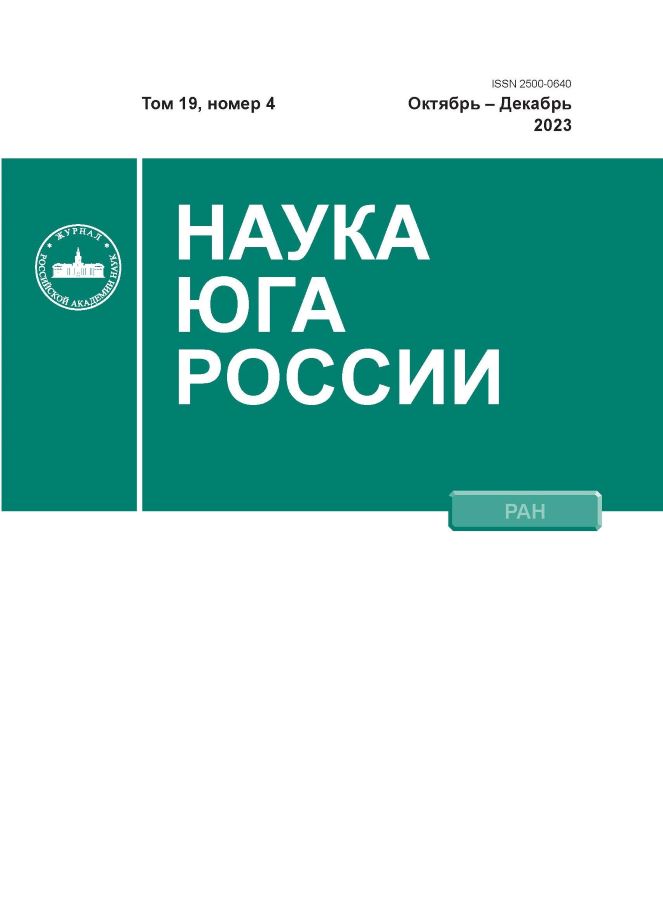Study Of The Influence Of Modification Of The 2Н1Н Isotopic Composition Of The Medium On The Growth Of Biomass And Respiratory Activity Of The Bacterial Culture SHEWANELLA ONEIDENSIS MR-1
- 作者: Volchenko N.N1, Samkov A.A1, Khudokormov A.A1, Talko A.A1, Malyshko V.V2,3, Barysheva E.V2, Ustymenko O.N4, Lyasota O.M3, Baryshev M.G3,5
-
隶属关系:
- Kuban State University
- Kuban State Medical University of the Ministry of Health of the Russian Federation
- Federal Research Centre the Southern Scientific Centre of the Russian Academy of Sciences
- Mari State University
- All-Russian Research Institute of Phytopathology
- 期: 卷 19, 编号 4 (2023)
- 页面: 67-73
- 栏目: Articles
- URL: https://journals.eco-vector.com/2500-0640/article/view/628060
- DOI: https://doi.org/10.7868/S25000640230406
- ID: 628060
如何引用文章
详细
作者简介
N. Volchenko
Kuban State UniversityKrasnodar, Russian Federation
A. Samkov
Kuban State UniversityKrasnodar, Russian Federation
A. Khudokormov
Kuban State UniversityKrasnodar, Russian Federation
A. Talko
Kuban State UniversityKrasnodar, Russian Federation
V. Malyshko
Kuban State Medical University of the Ministry of Health of the Russian Federation; Federal Research Centre the Southern Scientific Centre of the Russian Academy of SciencesKrasnodar, Russian Federation; Rostov-on-Don, Russian Federation
E. Barysheva
Kuban State Medical University of the Ministry of Health of the Russian FederationKrasnodar, Russian Federation
O. Ustymenko
Mari State UniversityYoshkar-Ola, Russian Federation
O. Lyasota
Federal Research Centre the Southern Scientific Centre of the Russian Academy of SciencesRostov-on-Don, Russian Federation
M. Baryshev
Federal Research Centre the Southern Scientific Centre of the Russian Academy of Sciences; All-Russian Research Institute of Phytopathology
Email: baryshev_mg@mail.ru
Rostov-on-Don, Russian Federation; Moscow Region, Russian Federation
参考
- Basov A., Fedulova L., Vasilevskaya E., Dzhimak S. 2019. Possible mechanisms of biological effects observed in living systems during 2H/1H isotope fractionation and deuterium interactions with other biogenic isotopes. Molecules. 24(22): 4101. doi: 10.3390/molecules24224101
- Syroeshkin A.V., Antipova N.V., Zlatska A.V., Zlatskiy I.A., Skylska M.D., Grebennikova T.V., Goncharuk V.V. 2018. The effect of the deuterium depleted water on the biological activity of the eukaryotic cells. Journal of Trace Elements in Medicine and Biology. 50: 629–633. doi: 10.1016/j.jtemb.2018.05.004
- Lobyshev V.I. 2018. Biphasic response of biological objects on variation of low deuterium concentration in water. International Journal of High Dilution Research. 17(2): 12–13. doi: 10.51910/ijhdr.v17i2.929
- De Wit J.C., van der Straaten C.M., Mook W.G. 1980. Determination of the absolute hydrogen isotopic ratio of VSMOW and SLAP. Geostandards Newsletter. 4(1): 33–36. doi: 10.1111/j.1751-908X.1980.tb00270.x
- Zlatska A., Gordiienko I., Vasyliev R., Zubov D., Gubar O., Rodnichenko A., Syroeshkin A., Zlatskiy I. 2018. In vitro study of deuterium effect on biological properties of human cultured adipose-derived stem cells. Scientific World Journal. 2018: 5454367. doi: 10.1155/2018/5454367
- Dzhimak S.S., Svidlov A.A., Basov A.A., Baryshev M.G., Drobotenko M.I. 2018. The effect of single deuterium substitutions for protium in a DNA molecule on the occurrence of open states. Biophysics. 63(4): 497–500. doi: 10.1134/S0006350918040061
- Dzhimak S.S., Drobotenko M.I., Basov A.A., Svidlov A.A., Fedulova L.V., Lyasota O.M., Baryshev M.G. 2018. Mathematical modeling of open state in DNA molecule depending on the deuterium concentration in the surrounding liquid media at different values of hydrogen bond disruption energy. Doklady Biochemistry and Biophysics. 483: 359–362. doi: 10.1134/S1607672918060169
- Wang H., Zhu B., He Z., Fu H., Dai Z., Huang G., Li B., Qin D., Zhang X., Tian L., Fang W., Yang H. 2013. Deuterium-depleted water (DDW) inhibits the proliferation and migration of nasopharyngeal carcinoma cells in vitro. Biomedicine and Pharmacotherapy. 67: 489–496. doi: 10.1016/j.biopha.2013.02.001
- Boros L.G., D’Agostino D.P., Katz H.E., Roth J.P., Meuillet E.J., Somlyai G. 2016. Submolecular regulation of cell transformation by deuterium depleting water exchange reactions in the tricarboxylic acid substrate cycle. Medical Hypotheses. 87: 69–74. doi: 10.1016/j.mehy.2015.11.016
- Basov A.A., Kozin S.V., Bikov I.M., Popov K.A., Moiseev A.V., Elkina A.A., Dzhimak S.S. 2019. Changes in prooxidantantioxidant system indices in the blood and brain of rats with modelled acute hypoxia which consumed a deuterium-depleted drinking diet. Biology Bulletin. 46(6): 531–535. doi: 10.1134/S1062359019060049
- Kravtsov A.A., Kozin S.V., Elkina A.A., Shashkov D.I., Baryshev M.G., Vasilevskaya E.R., Fedulova L.V., Popov K.A., Malyshko V.V., Moiseev A.V. 2018. Effect of drinking ration with reduced deuterium content on brain tissue prooxidantantioxidant balance in rats with acute hypoxia model. Journal of Pharmacy and Nutrition Sciences. 8(2): 42–51. doi: 10.6000/1927-5951.2018.08.02.3
- Xie X., Zubarev R.A. 2014. Effects of low-level deuterium enrichment on bacterial growth. PLoS ONE. 9(7): e102071. doi: 10.1371/journal.pone.0102071
- Rodin S., Rebellato P., Lundin A., Zubarev R.A. 2018. Isotopic resonance at 370 ppm deuterium negatively affects kinetics of luciferin oxidation by luciferase. Scientific Reports. 8(1): 16249. doi: 10.1038/s41598-018-34704-0
- Dzhimak S.S., Basov A.A., Kopytov G.F., Kashaev D.V., Sokolov M.E., Artsybasheva O.M., Sharapov K.S., Baryshev M.G. 2015. Application of NMR spectroscopy to the determination of low concentrations of nonradioactive isotopes in liquid media. Russian Physics Journal. 58(7): 923–929. doi: 10.1007/s11182-015-0591-9
- What is MicroRespTM? URL: https://www.microresp.com (дата обращения: 15.03.2023).
补充文件








